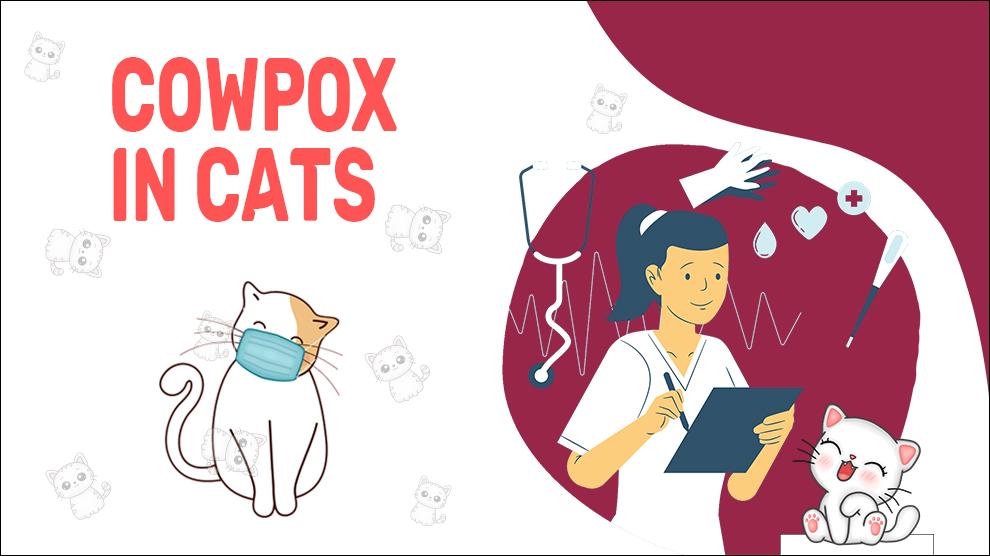What Is Cowpox In Cats?
Cowpox is a viral infection that affects cats and can be transmitted to humans. It is caused by the cowpox virus, which is related to the smallpox virus.
Symptoms may include fever, lethargy, swelling and redness at the site of infection, and the development of small, raised blisters or lesions on the skin.
Treatment typically involves supportive care, such as fluid therapy and pain management, as well as antiviral medication if available.
Preventative measures include avoiding contact with infected animals and practicing good hygiene.
Clinical Signs Of Cowpox In Cats
Symptoms of cowpox in cats may include:
- Fever
- Lethargy
- Loss of appetite
- Nasal Discharge
- Diarrhea
- Depression
- Skin Lesions
- Crusting On The Skin
- Rapid Breathing
- Coughing
- Excessive Panting
- Mucus Discharge In Eyes
- Gagging
- Ulcer In Mouth
- Skin Bumps
- Skin Ulcer
- Swelling and redness at the site of infection, which may develop into a small, raised blister or lesion
- Lesions may spread to other areas of the body, including the ears, nose, and paws
- In severe cases, systemic symptoms may occur, such as difficulty breathing and organ failure
It is important to note that symptoms may vary in severity and some cats may not show any symptoms at all.
Treatment Options For Cowpox In Cats
Treatment for cowpox in cats typically involves supportive care and may include:
- Fluid therapy to prevent dehydration
- Pain management to alleviate discomfort
- Antiviral medication if available
In severe cases, hospitalization may be necessary for more intensive care, such as oxygen therapy or intravenous fluids.
Additionally, infected cats should be isolated from other animals to prevent the spread of the virus.
Home Remedies For Cowpox In Cats
There are no known home remedies for cowpox in cats, and treatment should be sought from a veterinarian.
It is also important to ensure that the cat receives proper nutrition and hydration during recovery, and any underlying conditions that may have contributed to the development of the infection should be addressed.
How To Prevent Cowpox In Cats?
Prevention of cowpox in cats involves avoiding contact with infected animals and practicing good hygiene.
Measures to prevent infection may include:
- Avoiding contact with rodents and other potential carriers of the virus
- Providing a clean and sanitary living environment for cats
- Properly disposing of bedding and food contaminated with infected material
- Practicing good hygiene, such as washing hands regularly and avoiding contact with potentially infected animals
Affected Cat Breeds Of Cowpox
There are no specific breeds that are more prone to cowpox in cats. However, cats that spend time outdoors in rural areas may be more likely to come into contact with the virus.
Causes For Cowpox In Cats
Causes:
Cowpox is caused by the cowpox virus, which is related to the smallpox virus.
The virus is typically spread through contact with infected animals, such as rodents or cows, although transmission from cats to humans is also possible.
In cats, the virus may enter through a scratch or bite from an infected animal or through contact with infected material, such as bedding or food.
When To See A Vet For Cowpox In Cats?
If you suspect your cat may have cowpox, it is important to seek veterinary care immediately. Early treatment can help prevent the spread of the virus and improve the chances of a successful recovery.
Additionally, if you have been in contact with an infected cat, you should seek medical attention promptly to prevent transmission to humans.
Food Suggestions For Cowpox In Cats
In terms of food suggestions, it is important to provide the cat with a balanced and nutritious diet that supports overall health and well-being.
This may include high-quality protein sources, healthy fats, and essential vitamins and minerals.
Consultation with a veterinarian or veterinary nutritionist may be beneficial in developing a suitable diet for a cat with cowpox or other health concerns.
Conclusion
Cowpox is a rare but potentially serious viral infection in cats that can be transmitted to humans. Symptoms may include fever, lethargy, and the development of small blisters or lesions on the skin.
Treatment typically involves supportive care and antiviral medication if available, and preventative measures include avoiding contact with infected animals and practicing good hygiene.
If you suspect your cat may have cowpox, it is important to seek veterinary care immediately.











